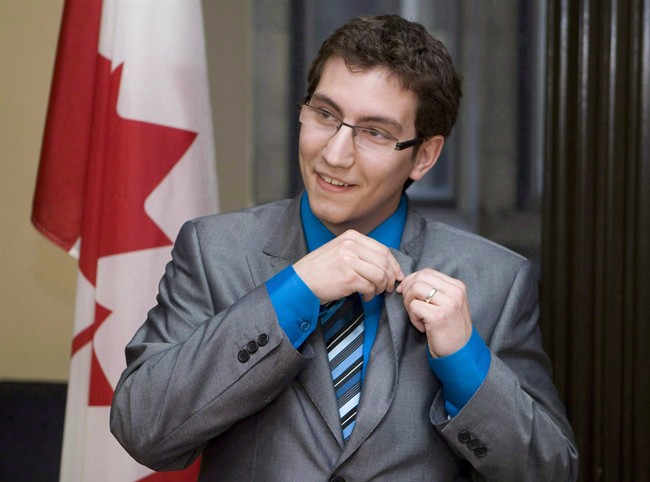OTTAWA – In 2011, Mylene Freeman became a New Democrat member of Parliament almost by accident. In 2015, she intends to be elected on purpose.

Freeman, 25, is one of a half-dozen MPs who were barely in their 20s in 2011 when a surge of support for the NDP in Quebec saw them become MPs, despite never having set foot in their ridings during the campaign.
Questions swirled about whether this rookie class would last even a single sitting. Not only did they prevail, but so far all but two have committed to running for re-election in 2015.
“When we first got elected, nobody really expected young people to be able to do the job,” Freeman said in an interview.
“So that very much motivated me to prove that wrong – and I think we have.”
Only 19 when he was elected, NDP MP Pierre-Luc Dusseault had the distinction of becoming the youngest person ever voted into the House of Commons.
He didn’t say much for the first little while, but slowly found his voice. Before the election, Dusseault planned to work at a golf course. He now chairs a committee overseeing the entire operations of government.
“You have such big responsibility and if you want to succeed you have to work, work hard, work every day,” Dusseault said.
“It’s a different life than others who are my age, who are 23, still in university.”
It’s not just Freeman and Dusseault going into 2015 a little wiser. All of Parliament has been forced into growing up a little.
Liberal Leader Justin Trudeau suspended MPs Massimo Pacetti and Scott Andrews from caucus last month amid explosive allegations of “serious personal misconduct” involving two of their NDP counterparts.
READ MORE: Trudeau names lawyer to probe MP misconduct claims
Creating a better political climate for women is one of the reasons Freeman says she wants to run again.
“This place isn’t built for women,” Freeman said. Ironically – and unbeknownst to her – a male colleague from another party could be seen taking note of her physique as he passed behind her while she spoke.
“It has been one of my motivating factors for seeking re-election and encouraging other women to run, because I think that’s how we’re going to change it over time.”
Though whispers of impropriety have coursed through the halls of power in Ottawa for decades, the suspension forced Parliament to confront it publicly for the first time and examine how ill-equipped it is to deal with the interpersonal realities of a modern workplace.
A harassment prevention policy was implemented just this past week.
Parliament also learned it was not immune from security threats.
Cpl. Nathan Cirillo was shot dead Oct. 22 as he stood sentry at the National War Memorial, moments before gunman Michael Zehaf Bibeau stormed the Centre Block, where he died in a fearsome gun battle with security forces.
The two incidents are neither alike nor related, but there is a lesson in both, said Liberal deputy leader Ralph Goodale.
“Don’t take your values, your security, or your rights and privileges for granted. They are very precious things and you need to behave accordingly in order to safeguard them,” Goodale said.
Ever since the shooting, members of the NDP stare at a bullet hole in their caucus door as a reminder.
“Of course it affects us personally,” said the NDP’s Nathan Cullen.
“The effort we’ve been making is to not affect us in the way that we make laws, that we keep our emotions where they are and our intelligence as forward as we can.”
The Conservatives have introduced legislation in recent years designed to address domestic terrorism, though opponents point out no existing law stopped Zehaf Bibeau.
That’s why the attacks of Oct. 22 will usher in another, as-yet-unspecified bill sometime next year, the government has said.
But what most are more keenly awaiting is the next budget, expected to clearly set the stage for the October 2015 campaign.
A suite of financial measures aimed at plumping up the pocketbooks of families will come into effect next year as the government begins to spend the budget surplus.
Much has already been spoken for, with about $1.6 billion left in the kitty for the upcoming federal budget.
“Canadians expect their government to focus on maintaining Canada’s relative economic strength,” said government House leader Peter Van Loan.
“We will do just that as we continue to build on our record for hardworking Canadian families.”
Key to the Conservative messaging in 2015 will be that the NDP and Liberals will claw back the financial measures, if elected.
In some ways, said Goodale, the election will be a reverse referendum on spending the surplus, since there was never a national conversation ahead of time about how it ought to be spent.
“The government is obviously trying to make everything a fait accompli in advance of an election, so that they can say, ‘It’s all over and done with, let’s move on,”‘ he said.
“But I think Canadians are not going to be snookered into simply accepting the status quo as a done deal that they don’t have the right to question.”



Comments